# 会说话的语法课
# 第001课 课程介绍 抓住声音
- 语法回归语言,语言的声音属性
He is a student. - 具体例句更重要,如下虽然是主系表结构,但从语义和声音皆不同
He is a student.表明身份He was a student.好可惜他怎么就失学了呢,表达一种惋惜He is going to be a student.他要成为一名学生了,表达一种期望He has been a student.他已经成为一名学习,应该有教养 训练有素
- 具体方法论,用耳朵学语法
He is going to be president./hi ɪz'gənə bi/ a doctor.~~~ a driver.~~~ a teacher.~~~ very hard-working.gonna be 文字改变去适应声音
# 第002课 一般将来时 is gonna
The boy is going to arrive on time.轻重缓急He is going to be a teacher.He is going to be here tomorrow.It's really gonna be a party.He is gonna be a tremendous help.China is gonna change the world.Your work is gonna fill a large part of your life.
语法结构
- 主语 + be going to + be + 名词
- 主语 + be going to + 动词短语
# 第003课 一般将来时 not gonna
- 每个章节只解决一个专属问题
- 练习的具体方法
- 分段练习
- 高频率、快速度、大剂量
We're gonna have a lot of fun.- 很近的将来
- 主观的预期
You're gonna screw up the business.- 一种预警
I'm gonna write you a letter soon.- 主观情绪
You brother and I are gonna miss you at Christmas.- 主观情绪
You know she is gonna give it up.- 主观判断
小结:将来时不仅是将要发生的事,有可能是盼望发生的事
You're not(0) gonna play music really loud.
语法结构
- You're not gonna.... 当做一个整体 -> 你不会....
# 第004课 一般将来时 Ishe gonna
and that's gonna ba a key support for meYou're gonna be a mighty nation.
语法结构 积累现象
- Youaregonna... 你将要
- Heisgonna... 他将要
- Sheisgonna... 她将要
- I'mgonna... 我将要
- Theyaregonna... 他们将要
按照 陈述句 否定句 疑问句,今天来研究一般将来时的疑问句
Ishegonna play basket-ball?~~~ make you feel happy?~~~ move to his new house?Is she gonna come out with the book this year?Is he gonna get married soon?Is he gonna leave his present job?Is she gonna pee on me?
另外结尾的声调来提问,极大弱化开头 is 会特别听起来不清楚
# 第005课 一般将来时 Whereishe gonna
- 一般疑问句 - 可以用 是或否 回答 (知道答案,但不确定)
- 特殊疑问句 - 必须用具体信息回答 (不知道答案,想知道是什么)
Is she gonna go to Marco?Where is he gonna go?Where is she gonna go?Where is it gonna go?Where are you gonna go?Where is she gonna go? She is gonna live in Suzhou.Wh-movementWhere is he/she gonna...要练得特别熟How is he/she gonna...要练得特别熟When is he/she gonna...要练得特别熟What is he/she gonna...要练得特别熟
# 第006课 一般将来时 will and gonna
英语时态其实只有 现在 和 过去
- I take a bath.
- I am taking a bath.
- I took a bath.
- I am going to take a bath.
- I will take a bath. wil词性其实是情态动词
- It will rain.
- It may rain later.
- It might rain later.
- It must rain.
will 尽量脱离主观情绪,以客观的口吻表达自己主观意见
- I am going to take care of the puppy. 和object-puppy距离更近
- I will take care of the puppy. 距离略微远点
- 道可道非常道
因果关系强烈 可用 be going to
- Look at the spelling mistakes in the resume, you are not gonna make a good impression.
- Look at the time, I'am gonna miss the train. 其他 即将发生 情绪强烈
- Wow, it's dilicisous. He's going to enjoy the meal.
- Help! I'm going to fall.
will 客观因素
There will be much rainfall next year.If the crop fails, people will starve.You will feel better when you get some rest.
语法原理
- be going to 当前关联性较大,will相反
- be going to 表示即将道理啊,will不然
- 表示预测试,will语气更客观
# 第007课 一般现在时 Sheisa
句子分两类:状态 动作
- 状态
I am a big fan of hers. - 动作
I finish my homework before 5 o'clock. - 动作
No one gives a damn to this idea. - 状态
She seems to make money go a long way.感官动词
先 linking verb 说起
connect the subject and its attributes they do not show any action simply link the subject with the rest
I am really nervous at the meeting.Learn maths is important for logic capability.Sometimes, kids are foolish.Martin is fond of spicy fool.
语法结构
- 主语 + am/is/are + 主语的特征,体现在语音上时系动词弱读
- 靠着积累,听不清时脑补这些音
- Heis
- Sheis
- Iam
- Youare
- Theyare
# 第008课 一般现在时 Is it a
Is he a policeman? Yes, he is.Is she your new teacher? Yes, she is.Is it a good day today? No, it isn't.Are you a beer drinker?
语法理论
- 结尾的语调和句首的结构
- 继续要熟悉每一种情况
- 如何回答一般疑问句
# 第009课 一般现在时 Whatis
What is your name?What is your father's job?What are you doing?What are your special interests?
化繁为简:语音分组、多个音节变为一个
What is he?What is her position in the company?Where is his brother?Why is her son so upset?What is he like?Where is he?What are her pains?名词 pains 之前可以加哪些呢,猜一猜What are her injuries?What is his flaw?
like 介词 介绍两者之间的关系
- It's like an apple.
- We are like a family.
- The lake is like a mirror.
大量积累
Whatis your favorite food?Whatis his main concern?Whatis that in his hand?What are her reasons for the job?What are his problems at shool?
句型结构
疑问词 + 助动词 + 其他?
- Whatis his ... h不发音
- Whatis her ... h不发音
- Whatis your ... you弱读/jr/
- What are her ...
- Waht are his ...
# 第010课 一般现在时 linking verb
simple present tense
- habitual actions ro occurrence
- something always true
- regular things
- things at the moment
Qualities
He is very rich.Their father is old now.
Jobs and professions
Both of my brothers are policeman.He's a firefighter.
Age
How old is she? She is 5 years old.
Relationship
He is my first cousin.They are my best friends.Are you her sister?
Place
Her house is on the edge of the lake.The shops are at the end of the street.
Time
What time is it?
类似 be
He looks very rich.Their father appears old now.The weather feels terrible.
# 第011课 一般现在时 third-person
Simple Present Tense
Knowledge is power.Great minds think alike.The earth moves around the sun.The sun rises in the east.
fist-person I we 朕 second-person you third-person 不是对话的双方,数量上就一个
- she he it
- the dog
- the boy
句型结构
- takes 当作一个独立的词
- unexpectedly 当作一个独立的词
# 第012课 一般现在时 wizard
节奏的变化,朗读的重要性
- 一去二三里 烟村四五家
As in a fever, tye boy runs back.It usually takes me four to five years.
语法理论
经常发生的动作或状态
# 第013课 一般现在时 goodatit
- Are you OK ?
- Are you sure ?
- Are you Jack's sister ?
- Are you good at it ?
be会很微弱(可以通过主语倒推),更多的是通过声调表示疑问
Who is goodatit?Whenishe goodatit?Is he goodatit?Is he gonna goodatit?Nobody's gonna goodatit?What are you good at?
Doyou 弱读 一般疑问句 语法学习词汇化
/dəjə/ like it?/dəjə/ go to school?/dəjə/ know me?/dəjə/ enjoy the meal?/dəjə/ have to take the chance?Do you wanna go to starbucks?
特殊疑问句
Which one do you like best?When do you start your new job?
句型结构
- areyou 你(是)...?
- ishe 他(是)...?
- isshe 她(是)...?
- arethey 他们(是)...?
- goodatit 哎?声音明明是连起来的,怎么单词却是分开的
# 第014课 一般现在时 sortof
Do you have anything to say for yourself?Do you have any favorite?Do they love cartoon movies?Does John always go to school late?
口头语 sort of
Does he sort of try to get even?I have a sort of feeling that he will not come.
语法理论
- 不是语法告诉我们怎么说,还是我们会说了之后,再看看语法
- do does 弱 能弱几乎没有
- 意群 分而治之
# 第015课 一般现在时 Anddoesshe
一般疑问句
Doeshe have a temperature?Doeshe have any family?Doeshe often give seats to others in the bus?Doeshe often do his homework at night?Anddoeshe have any brothers and sisters?Anddoesshe speak French?那么她说法语吗?Anddoesshe have enough time to do it?那么她
否定句
Hedoesn't like to talk about his private life.
语法理论
- Anddoesshe 重音在she
- Hedoesn't 重音在does'nt
# 第016课 一般现在时 healthcareissue
Doesshehave to do something on the health care issue?Whatdoeshe ususally do at weekend with his brother?Whatdoesit mean to be a super attactor?Wheredoeshe live?Where does he come from?
# 第017课 一般现在时 Whatdoeshe
What does he usually do after school?Waht does he know about the football?
# 第018课 一般现在时 can /kn/
I can write a letter.He can know how to talk to a stranger.She must share her apples with others.They may learn to understand more.
can
- can means somethings is possible for sb/sth to do sth 有可能发生
- somebody knows how to do sth 知道如何做
- can can be used to show that sb is allowed to do sth or has the ability do do sth. 被允许、有能力
I can do it.She can cook again.You can hike, you can dance, you can work, you can sleep, you can love.You can get me on 010-5555555.Some people can only work well under pressure.I can only speak to my own experience.
情态动词
- must 小朋友说的
- need
- can
- could
- should
- may 领导说的
- might
- had better
打破这种对比排序,建立每个词的认知,不要找规律
# 第019课 一般现在时 Canhe
Can you accept the idea?Can you speak English?Can you put your books all together in this box?Can you tell us where the gaps are?Can you or can you not do this?Can I get my money back?Can he be serious?Can he getupat 6 o'clock tomorrow?Can I take a look at the picture?Can I pay you a visit this afternoon?
语法学习词汇化
- Canyou 你能...?
- Canhe 他能...?
- Canshe 她能...?
- Canwe 我们能...?
- Canthey 他们能...?
# 第020课 一般现在时 cannot
I can not wait to support you.Fish can not live without water.I can not give an exact figure.She can not make any choice.My father can not shake off his cold.Tom can not lift the heavy box.You can not agree with the reason.Now, she can not afford to help me.
语法学习词汇化
- Hecannot 他不能能...
- Shecannot 她不能能...
- Wecannot 我们不能能...
- Theycannot 他们不能能...
- Youcannot 你不能能...
否定句 要突出 not
# 第021课 一般现在时 can't
She can't pay the money now.I can't stand people like him.She can't make her mind to accept it.No one can touch hi at school.I can't keep up with all the changes.I can't believe what you said just now.
语法学习词汇化
- cannot
- can't 戛然而止
- can 平铺直叙
# 第022课 一般现在时 ableto
but, I'm able to work with other people.so I am able to break the rules.
able to: to have the skill, intelligence, opportunity to do sth.
I am able to work under great pressure.I am able to establish a good relationship with others.I am able to operate the computer well.If you tell me more, I am able to write more.Everyone is able to live their full self.
DANGER
can 主观情绪
able to 平铺直叙
Iam ableto....
Heis albeto....
Sheis ableto....
Theyare ableto....
Youare ableto....
# 第023课 一般现在时 Aretheyableto
Am I able to fly it?Am I able to turn my intentions into actions?Is he able to connect with others?Is he able to concentrate on his work?Are they able to cut with scissors?
具体句型
Isheableto 他能...吗?Issheableto 她能...吗?Isitableto 它能...吗?Areyouableto 你能...吗?Aretheyableto 他们能...吗?AmIableto 我能...吗?
英语的块状结构
What isheableto talk with you?What issheableto paint on the paper?What isitableto show you now?How areyouableto arrive here?When aretheyableto climb the hill?How is he able find his way?How are you able to find humor in your situation?
DANGER
每个时态中的 每个人称之下的 每个句型 都具有其独立结构
# 第024课 一般将来时 will
He can go to the gym.He must go to the gym.He will go to the gym.
will 可以认为是情态动词,表示一种可能性
will 发音弹出来 l用力
He will understand a lot soon.She wil walk to school at 8.She will be very happy when she sees you.It will be very expensive when you don't buy it.The man will cut the grass this afternoon.
# 第025课 一般将来时 will
They will lend us some money.She will learn to play tye violin.The waiter will open the door for you.The teacher will teach you English next term.They will play basketball after school tomorrow afternoon.She will be 15 years old next year.They will leave for Japan tomorrow.The bus will come here in half an hour.
# 第026课 一般将来时 will vs gonna
The man is going to have a try of the car.She will learn English next term.
当做新的词汇来学习 短促 当作一个音节
- She'll
- We'll
- He'll
- They'll
- I'll
- You'll
例子走起
I'm sure she'll learn from her mistakes.She'll listen to music by herself in the room.Shel'll be able to take care of the children.We'll be friends for ever.
区别
- be going to (某人)正要去...
- 发生的可能性较大
- 据当前情况推测 - 时间较近
- 说话者主观色彩更大
- will 预计...(某动作)
- 预测的可能性可大可小
- 说话者主观色彩较小
- 发生的时间可近可远
# 第027课 一般将来时 willnot
Iwillnot describe them.Shewillnot stay in the job.Shewillnot watch a hockey game with me.Wewillnot make it.
具体句型
Youwillnot ... 你将不会... Youwon'tHewillnot ... 他将不会... Hewon'tShewilnot ... 她将不会... Shewon'tIwillnot ... 我将不会... Iwon'tTheywillnot ... 他们将不会... Theywon't
缩写
She won't be able to do that.You won't be the only one.
# 第028课 一般将来时 Whatwillyou
Will he give you an offer?Will you represent it?Will I need to learn more about driving?Will you take your books off the shelf?Will you be able to come?Will he get up early tomorrow?Will they allow you to sit on the chair?
具体句型
WillI... 我将要...?Willyou... 你将要...?Willhe...Willshe...Willwe...Willthey...
一般疑问句 -> 特殊疑问句
Will he finish his job in five days?What will he do in five days?When will he finish his job?Why will you choose this major?Where will she get the money?When will she be free?What will they think of each other?What will my first question be?
具体句型
Whatwillyou... 你将会....?Whenwillhe... 他何时将会...?Wherewillyou...WhywillI...Howwillshe...Whywillthey...
# 第029课 介词 preposition
preposition "在之前的位置上"
on the deskunder the table 表示方位across the space/street/grasslandbecause of the weather 表示抽象关系by bus/bike/air...
位置关系
There's a chair [behind | near | beside | in front of] the door.I can see a bird in the sky.Jack lives in London.The plates are on the table.The girls are in the school.The boys are sitting in the car.We stopped at London on the way to NY.at 相对而言小站
有些介词用法比较固定,那说话者说的时候就会弱化,那听起来就需要脑补一下
arrive at a pointHarold and I arrive in New York.I would arrive at work.We're gonna arrive in our business.
at
at the cinemaat the partyat the doorat school 抽象短语 在上学at hospital 抽象短语 在就医at noonat night 一眨眼at church 做礼拜
盯着什么事情
stare atlook atshout atlaught at
preposition
A preposition is a word or group of words used before a noun, pronoun, or noun phrase to show direction, time, place, location, spatial relationships, or to introduce an object.
- 位置关系
- 动作趋势
- 时间点、段
# 第030课 介词 of short of
格式化语句越强,读音越不明显
Stress is a major problem of modern life.We have a team of volunteers.The car of the future is coming.Let's get back to the question of funding.So far the most reliable car of the day.and the man of short stories.
problem of 介词短语
team of 现在分词
car of 名词 过去分词
question of 定语从句
固定搭配
He is short of cash after his unemployment.We have had to raise our prices because of rising costs.Two players are out of the team becuase of injury.She takes care of his aged grandmother.
技校总结
- of: o与前面连读,后面辅音时,v吞音;后面元音时,v与此元音连读
# 第031课 介词 on over above
The government is running short of hard currency.I'd never let you go short of anything.She is not short of excuses where things go wrong.They had run short of fuel.We've run short of milk.
原声还原
We should just come out of it.You come out of it.
on "在 ... 之上(有接触面)"
The cat sleeps on the sofa.There's a mark on your skirt.There are some oranges on the floor.Puting it on the desk.I was on, I was on the desk.
over "在 ... 之上(有或没有接触面)"
The clouds move over the city.The sheep jump over the fence.He push me over the desk.She lives in the house above the valley.
above "在 ... 上空 (无接触面)" o 弱读
The plane is flying above the clouds.This house is 200m above sea level.He lifted his hands above his head.The mirror is above the sink.
# 第032课 介词 under below beneath
under 在 ...(正)下方 多看英文注释
To talk about something that is lower than something else, and that the other thing is directly above it.
The cat is under the table.记住声音、体会声音The shoes are under the bed.It's hot, so they stand under tree.
under、at、on、in、above、along... 介词常年累月的发展,元音开头方便跟前面辅音连读
All the experts are under one roofThey have it under their belt.Looked at it under the microscope.She's gonna have it under her front leg.We're all under this tent.
below 在..的下方
We can use "below" when there is not contact between people or things, or you can "below" when you're talking about something that's not physically or necessarily immediately under.
Kaifeng is just below the surface of the water.There is a bar below my apartment.The fish is below the surface of the water.Have you heard voices in the yard below your window?
We normally use "below" for things of a similar grouping.
Please do not write below this line.I put the new family photo below the old one.In the comments below this video.
beneath 在...下面 强调一种包裹感
covered by something directly under something or at a lower level under the surface of the ground or water
The treasure was buried beneath the sea.There's still something beneath the ground.
技巧总结
- 多看例句,多读多体会
- 尽量多看英文注释
# 第033课 介词 along across
on across
over through
above 位置 along 运动趋势
under away from
below ...
beneath
They walk along the beach.The trees along the road are very old.
介词短语修饰名词,置于名词之后,英语思维先说中心名词
the glass on the table
the picture on the wall
the fish in the water
the man in blue
the boy under the tree
along "沿着..."
Along often refers to movement in a linear direction.
This prepostion is used to describe someone or something that is moving in one direction.
She likes to walk along that road.There are no lights along the highway.I take a walk along the bank every morning.People could walk along the streets.He said he'd slowly drive along one street.
相互组合 也就那几种场景 run、go、walk、drive.... street、road、beach、bank....
across 在 ... 另一侧 二维表面
on the opposite side of something
Across is used to show movement from one side of a surface to another. With this prepostion, it is important to note that you do not need to be in contact with a surface to be able to move across it.
They walk across the bridge.We fly across the ocean.A man may choose to walk across a bridge or not to walk across it.You can walk across a street without getting hit by a car.
# 第034课 介词 through
through thr连在一块从喉咙发出 从...一边到另一边(内部)
Through is used to describe moving into the middle of something three-dimensional and then out the other side of it.
They walk through the forest.I looked outside through the window.It run through the women.Don't be afraid to walk through your door.
through 通过 从头到尾
To past a barrier, stage or test.
From the beginning to the end of an activity or a period of time.
He kept quiet through breakfast.When you get through it all...And we go through the same pattern all over again
# 第035课 介词 around
Around the corner here, is the technical station.It's just around the corner.round重读,a就可以和t连读Halloween is obviously around the corner.obviously b不发音I'm gonna walk around the garden.
around 在/到那边
We use 'around' when someone or something reached the other side of an obstacle, or is located there.
It can also mean moving in a circle, specifically moving along the outer edge of something until you have returned to your starting point.
run around the tree绕着树跑
run around a ...
walk around a ...
I run around the lake every day.
round 形容词/名词/副词
The fruit are small and round.She won the first round of the game.The earth goes round and round the sun.
around == round(preposition) in British English
# 第036课 介词 in on at
介词除了位置、运动趋势还有时间
I get up early in the morning.GeneralHe swims on Sunday.I'll see you at 8 p.m.Specific
We use 'in' when referring to an unspecific time of the day, a month, a season or a year.
The word 'on', when talking about time, is for specific dates and days.
'At' is used for a more specific time.
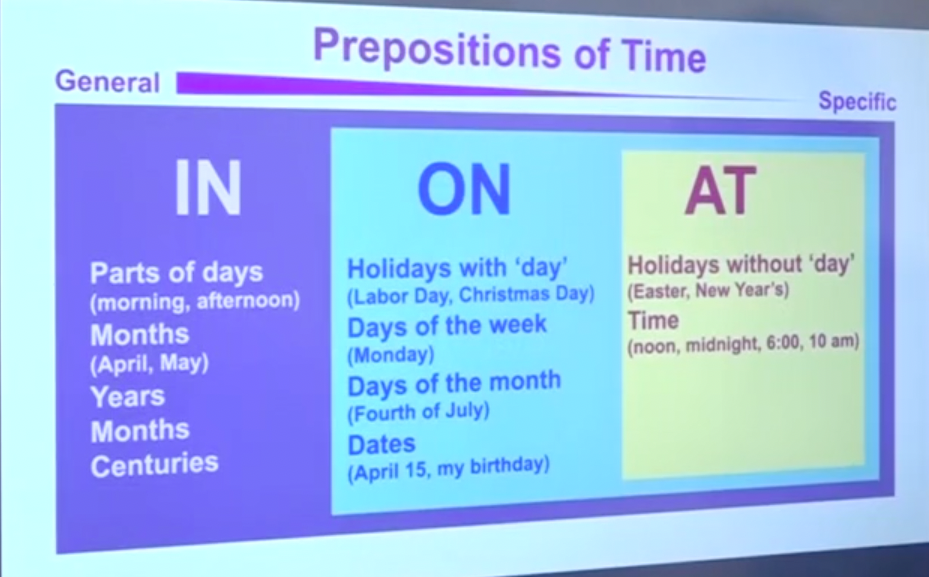
at night一眨眼at noon中午 12点at the weekend习惯 一周是一段时间,周末是一端 at the end ofBefore I went to sleep at night...It helps you sleep at night.
语音小段
are on aget on arun on ais at asit at awork at anis in a
# 第037课 介词 with
with 伴随着...
Together
Chris has been with Jane since that party last year.How long have you been with your boyfriend?Howlonghaveyoubeen 语义段Are you with Sammy? I'm trying to find him.
Agreement
I am with you, my dear friend.She is with him on this project, I think.
To use something
I can't believe you eat peanut butter with chop sticks.Please write the letter with this pen.
Having something
I'm looking for a new house with a pool.He quit because he needs a job with a better salary.
with i 弱读成 e
China is a country with a long history.She is a doctor with a sense of vocation.
例句
But you could take no money with you.
# 第038课 介词 like
He looks like his sister.It tastes like chicken.He dresses like a clown.He seems like a nice man.Mike is not like his brother.That looks just like my car.It seems like it is going to rain.
语音小段
look liketaste likeseem likedress like
例句
A landscape looks like a paiting.And it looks like a completely different world.It looks like a beautiful butterfly.小段Itlookslikea...That looks like a short cut.He's gonna tell it like it is.原原本本的说出
# 第039课 过去时 was/wereona
I was very angry, and I was deeply confused.I was on a horse the other day.
Iwasona 我在...上
I was on a bus then.I was on an island.I was on a beach in the dream last night.I was on a different level than the other students.I was on a flight.
Wewereona 我们在...上
Now, we were on a roll.We were on a hill at that time.We were on a walk in the country side.We were on a beach in the dream last night.We were on a conference call.
DANGER
- was 重读和弱读的语调要对应起来,不能搞混
- was 弱读时 捕捉声音的依据
- be 融化到句子里,改变了句子语音形象
# 第040课 过去时 wasshe
感官动词、系动词 继续弱读
look
sound
taste
feel
seem
....
Now apple tv looks beautiful.That sounds great.I feel bad for these athletes.That fish tastes terrible.You look nice in this dress.
积累例句
She was still half asleep just now.I was still awake when he came here.She was the only one in the campus.They were ready for the research of the Tang Dynasty.We were friends and colleagues for more than 20 years.
熟读例句
And when I was 18, I left school and went to art college for six year.It was an amazing thing when it happened.
一般疑问句
Was she still half asleep just now?Was she on the train at that time?Was she on duty at school yesterday?Was she late for school again and again?Was she good at maths when she was a school girl?
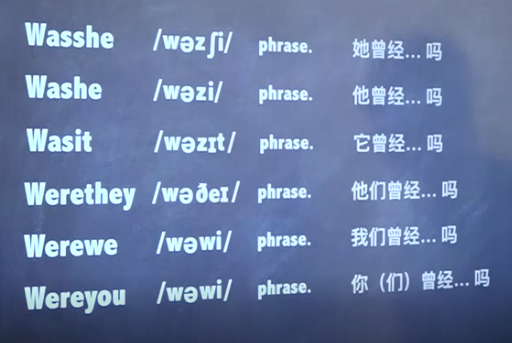
DANGER
- 强读部分加重,弱读自然到位
- 继续加强声音即语法的学习方法
# 第041课 过去时 Ifshewere wouldn't
If she were a man, we wouldn't even be questioning anything.You wouldn't take care of each other.They wouldn't turn it around.They wouldn't be able to come back.
woudn't 将不会... 语音转折声调
They wouldn't be safe where we wereI wouldn't agree with you on this plan.
Ifshewere 假设的情况,虚拟语气
If she were younger, she would learn programming.If she were here now, she could be helping us.If I were you, I wouldn't drink any more.If they were ther, I would vist them tonight.

If he were here, what would you say to him?
# 第042课 过去时 wasn't a
She was not able to reach the apple on the tree.She was not the only one in the classroom yesterday.She was not careful enough to take the mission.She was not so sure about the important job.She was not a clear girl, but she's really hard-woking.
例句走起 she was 轻声-平调-快速 not 升调
She was not calling anyone a name.She was not the only feminist in the house.She was not trying to be impolite.She was not trying to take her show.She was not very happy.
其他例子
He was not a handsome man.He was not a noble man.That was not a short answer.So it was not a surprise.
连写例子 zn 重点
She wasn't a teenager anymore.She wasn't a witch at all.at all 读音形象She wasn't talking about kids...She wasn't a couch potato.She wasn't happy about this.sh 拉长一点
# 第042课 过去时 Wherewereyou
Whatwasshe 她曾经...什么吗
What was she thinking about just now?What was she doing at that time?What was she reading last night?What was she like when she was a little girl?
例子走起
What was she like?What was she wearing?What was she gonna do?What was she talking about?Waht wash she saying?

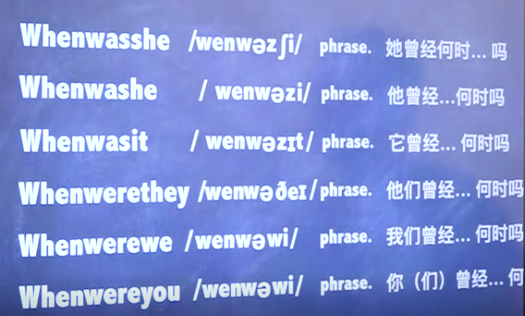
常用搭配 只有具体的声音
When was the last time... Where were you
When was the last time they saw it?When were you at your worst?Where were you born?Where were the people?where 稍微声调Where were you on 911?Where were you when you heard?
# 第044课 过去时 learned about
I worked for half an hour.ed 短促停顿They looked at the big clock on the wall.The boys watched the movie this morning.带气 tThe students enjoyed the big meal together.The girls learned English this term.
learned 压缩之后声音的样子 短促
We learned English in Grade 5.We learned how to drive in 18.She learned to teach children recently.I learned the relative theory these days.
learned about 甚至 ed 不发,连读为 nabout
# 第045课 过去时 I asked him
短暂的动作
so he asked me every single dayThe boy asked his teacher a question.He opened the door quickly just now.The man lifted the heavy box in the room.The manager finished his work just now.The little girl wanted to collect many stamps.wanted to 弱化读
例句走起
She asked me what she should do.She asked the monk.And he asked me why I stayed after school
I asked him
I asked him if he can wait for me.I asked him a question about philosophy.I asked him if he would help me.I asked him to get me some new information.I asked him several times, but he didn't answer.
# 第046课 过去时 I wanted to
And she wanted to make it easier for other people.Because I wanted to help people feel better.he wanted to propose求婚how she wanted to go through this
I wanted to 我曾想要...
She wanted to avoid another accident.
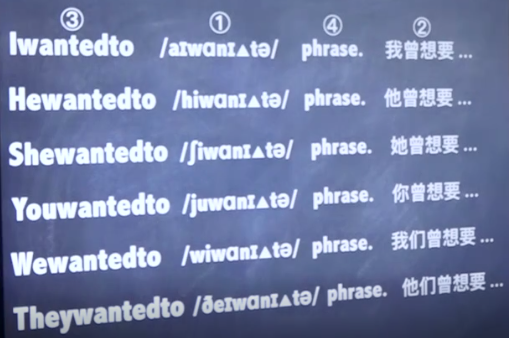
cleaned 最后的ed要干脆利落的收住;接不同的名词,翻译成汉语动词不同
She cleaned the living room for us.We cleaned so many broken bowls just now.She cleaned her shoes last Sunday.I cleaned the mud off my shoes.I cleaned my room all by myself!
cleaned up 比 cleaned 语气更强
He cleaned up his bad habits.She cleaned up the refrigerator at this time.The boys cleaned up their classroom today.Time was limited so he cleaned up quickly.We completely cleaned up the old wardrobe.
# 第047课 过去时 ran read
改变声音形象 runed -> ran 区别更强,语言进化
The software ran very well in the system just now.If you run after two hares, you will catch neither.The company ran an advertising compaign a year ago.
原声例句
I ran a half marathon.I ran towards her voice.He ran across the desert.when I ran for President
改变声音节奏,受到古英语影响
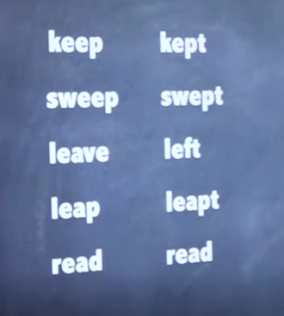
# 第048课 过去时 didn't
I didn't know.I didn't give up.I didn't want to paint any more.She didn't want to eat so much.
# 第049课 过去时 Did I
Did I read your mind?Did I deserve the success?Did I mess up?
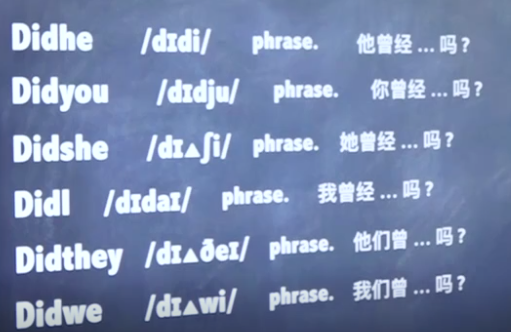
Did I spell your name right?Did I stand on your foot? Sorry!Did I say it clearly enouth?Did I make it?Did you make the deal?Did you get your work done in time?Did you have a good time in London?Did you get a present for you mother?Did she become a doctor?
特殊疑问句 What + 一般疑问句即可
# 第050课 过去时 Whatdidhe
What did he think about the movie?What did he eat at the table just now?What did he say to her?What did he do with the thirty pounds?What did he learn at school?What did talk about with his classmates?
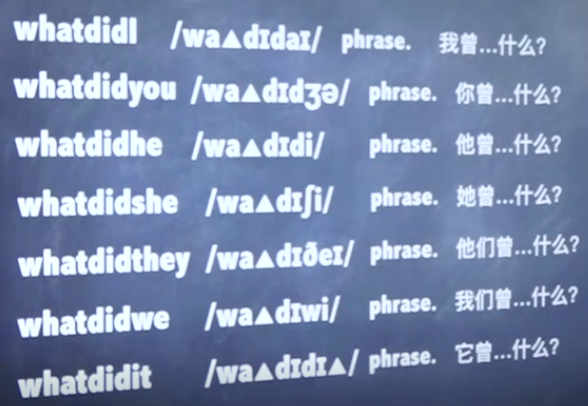
whatdidhe vs whatdidit
- 音准
- 节奏:舒缓 vs 停顿
What did it feel like when you got money?
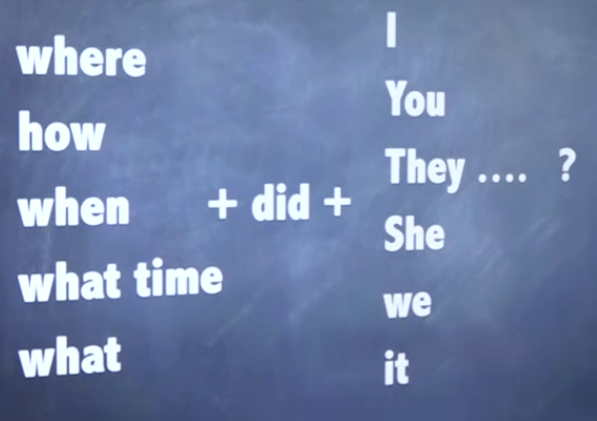
# 第051课 过去时 What When Where
What did you do for the first 30 minutes?When did it happen?Did you take a picture of it?He has a brother or sister.
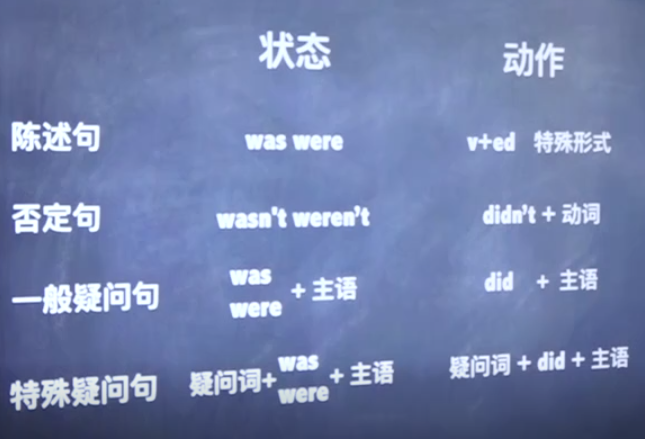
# 第052课 现在完成时 have/has 弱化
借助过去的动作,强调现在
I have taught you before.我有教过你哦!I have eaten already.我已经吃过了。His friends have already had the meeting.Everybody has already understood this.
# 第053课 现在完成时 Youhave You've
Maybe you have lost your job.You have lost years of knowledge.Some of you have lost your jobs.
Youhave 你已经... 和 You have 没有关系
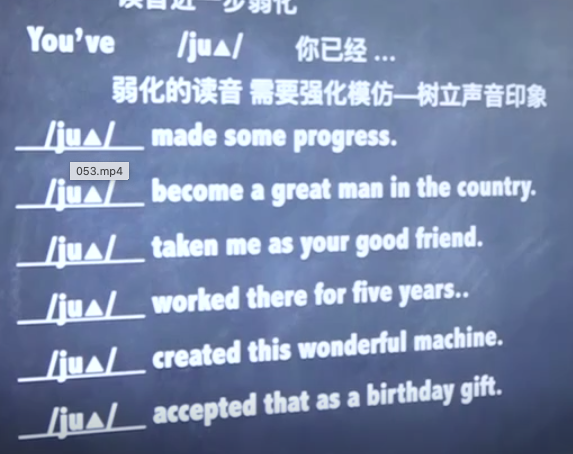
# 第054课 现在完成时 You'valready
现在完成时,其实是现在时
You'valready 你已经... 强调某事已经发生过
You'valready answered the teacher's question.You'valready lived here since 25 years ago.You'valready been the top student in the school.You'valready achieved your first goal.You'valready learned so many things in those years.
# 第055课 现在完成时 Ihavenot hasn't
I have not thought about it.I have not gone to the new park.I have not learned a lot about physics.We have not yet produced a new story.
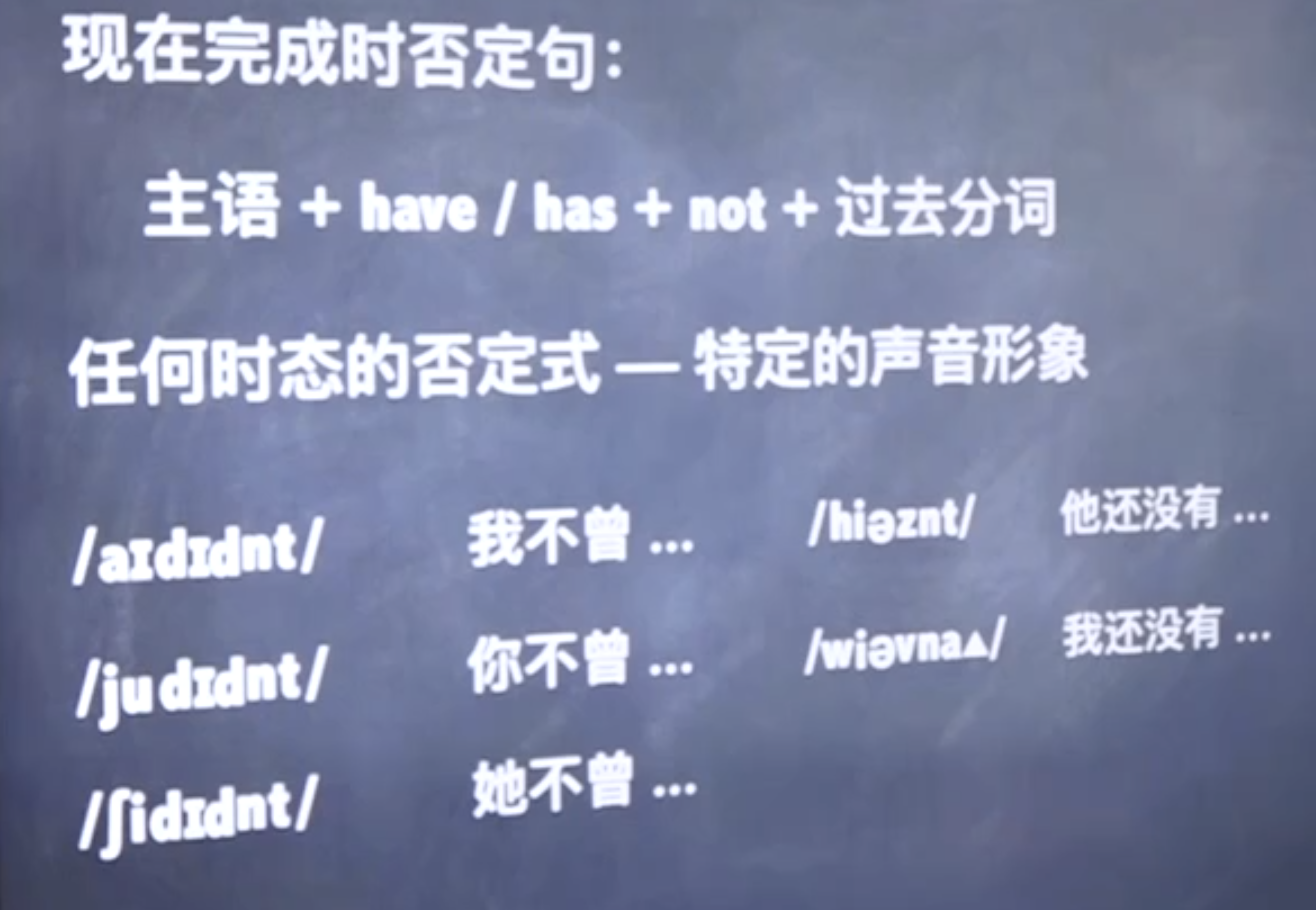
# 第056课 现在完成时 Have they
Have they known each other since 1999?
have 声音已经发生变化
# 第057课 现在完成时 Has he been
声音也是有含义的
/əzi/ 他已经...了吗? 动作
/əzi/ returned that book to you?/əzi/ given his speech at the meeting?/əzi/ got a new job in the bank?/əzi/ agreed with you?/əzi/ gone to another city for a living?/əzi/ read the news already?
/əzibɪn/ 他已经...了吗? 状态
Has he been a good student?Has he been away from here?Has he been in the city for a few years?Has he been a camera man int the TV station?Has he been tired after a hard day?
# 第058课 现在完成时 What've you
What've you done to your hair?
技巧总结
- 单词辅音开头时,要饱满
- 单词辅音结束时,要吞音
# 第059课 现在完成时 Where has he
Where has he seen her before?Where has he bought taht book?Where has he found his watch?Where has he worked since then?
# 第060课 过去完成时 had done
She had arrived here before 7 o'clock this morning.We had known it before you told us.She had learned English before 2005.He had lived here before he went to college.
技巧总结
- had h省略
# 第061课 过去完成时 Had you
Had they known each other before 1999?Had you seen the car before?
# 第062课 过去完成时 had not
I had not performed well in this exam.
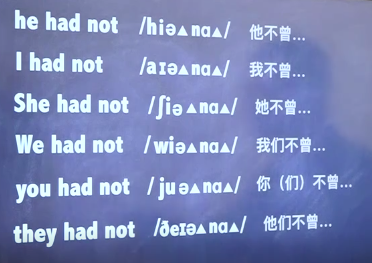
# 第063课 过去完成时 had hoped
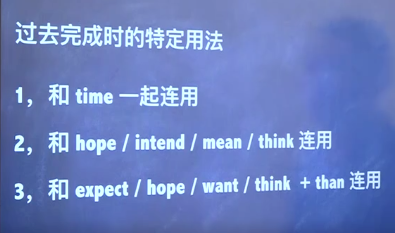
- 和 time 连用
It was the first time he had been late.那是他第一次...It was the first time he had come to know the truth.
- 和 hope / intend / mean / think 连用
I had hoped to send him a card, but I forgot.ptI had intended to see you last night, but I couldn't get away.I had meant to go on Monday, but I stayed.
- 和 expect / hope / want / think + than 连用
We arrived earlier than we hadexpected.It was easier than I had thought.Things didn't go so smoothly as we had hoped.The wasn't as clean as we had wanted.
# 第064课 过去完成时 What had you
What had you done before last week?What had you experienced?Where had you left your passport?Where had he gone since ..h 会更清晰些
# 第065课 现在完成进行时 have been doing
I have been doing... 我一直都在...
I have been talking like that all the time.I have been living here since my childhood.I have been dieting, and I lost 60 pounds.
He has been doing.. 他一直都在...
He has been reading a noval all night.
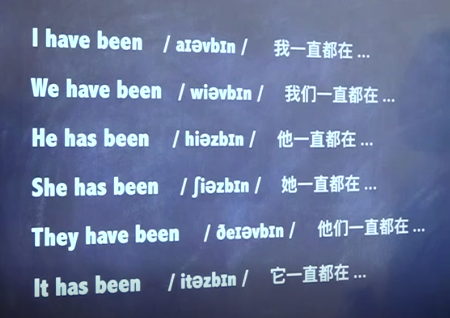
She has been complaining of a pain.
进行时比较
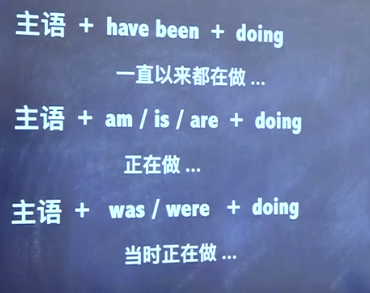
现在完成进行时强调动作持续性
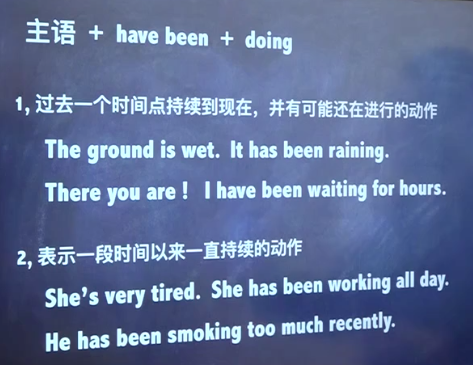
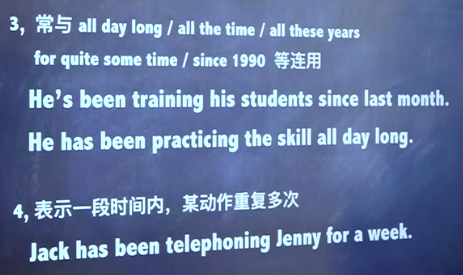
# 第066课 现在完成进行时 hasn't been doing
She hasn't been working.
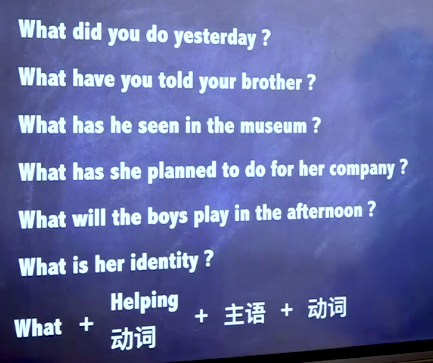
What have you been doing all along?
# 第067课 过去将来时 would
would 当时将要/打算 /wəd/
He said you would call me.I knew he would come here.He said you would not call me.
# 第068课 过去将来完成时 would have done
would have done 届时就已经完成 ...
would have finishedwould have readwould have writtenwould've seenwould've heard
wouldn'thave done 否定形式
They wouldn't have helped me.
# 第069课 过去完成时 If I had done
If I had seen you in the street, I would have said hello to you.If she had learned English, she would have understood.If he had fixed my car, he would have conferred on me a benifit.
自然拼读100讲 →